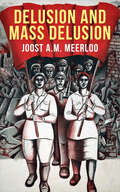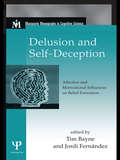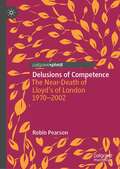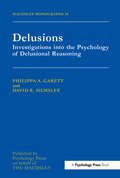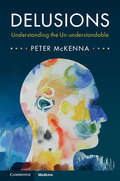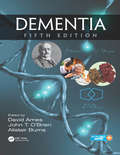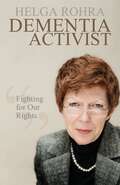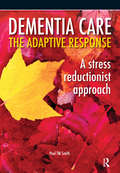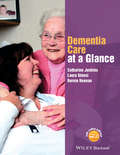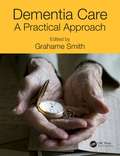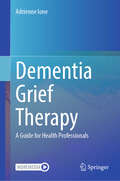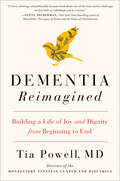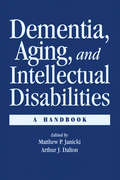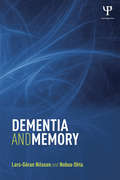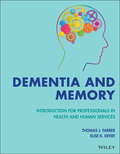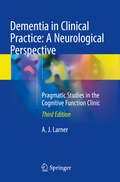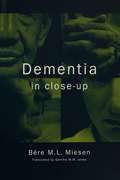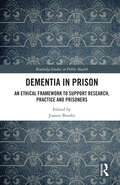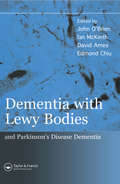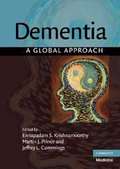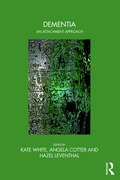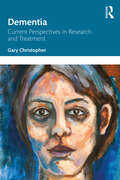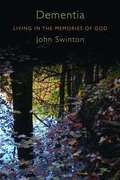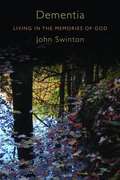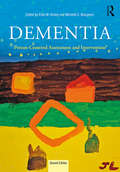- Table View
- List View
Delusion and Mass Delusion
by Joost A.M. MeerlooIn this classic of political and social psychology, Joost Meerloo attempts to account for the mechanisms of mind that have made the brainwashing techniques of totalitarian states so historically successful. His frightening conclusion, that "hardly anyone can resist," appeals to mechanisms undergirding human thought, many of which are not obviously available to individuals.
Delusion and Self-Deception: Affective and Motivational Influences on Belief Formation (Macquarie Monographs in Cognitive Science)
by Tim BayneThis collection of essays focuses on the interface between delusions and self-deception. As pathologies of belief, delusions and self-deception raise many of the same challenges for those seeking to understand them. Are delusions and self-deception entirely distinct phenomena, or might some forms of self-deception also qualify as delusional? To what extent might models of self-deception and delusion share common factors? In what ways do affect and motivation enter into normal belief-formation, and how might they be implicated in self-deception and delusion? The essays in this volume tackle these questions from both empirical and conceptual perspectives. Some contributors focus on the general question of how to locate self-deception and delusion within our taxonomy of psychological states. Some contributors ask whether particular delusions - such as the Capgras delusion or anosognosia for hemiplegia - might be explained by appeal to motivational and affective factors. And some contributors provide general models of motivated reasoning, against which theories of pathological belief-formation might be measured. The volume will be of interest to cognitive scientists, clinicians, and philosophers interested in the nature of belief and the disturbances to which it is subject.
Delusions of Competence: The Near-Death of Lloyd’s of London 1970--2002 (Palgrave Studies in Economic History)
by Robin PearsonThis book examines the crisis at the famous insurance market, Lloyd's of London, during the late twentieth century, which nearly destroyed the 300-year-old institution. While rapid structural change resulting from system collapse is less common in insurance than in the history of other financial services, one exception was the Lloyd’s crisis. Hitherto, explanations of the crisis have focused on the effects of catastrophic losses and poor governance. By drawing on contemporary accounts of the crisis, the author constructs the first comprehensive scholarly analysis of the public and political response. The book applies theoretical concepts from behavioural economics and economic psychology to argue that multiple delusions of competence were at work both within and outside the Lloyd’s market. Arrogance, elitism and defence of vested interests comprised endogenous elements of the crisis. Entrenched ideas about the virtues of self-regulation and faith in insider experts also played a role. The result was a misdiagnosis by both insiders and politicians of what ailed Lloyd’s and a series of reforms that failed to address the underlying causes of its disease. This book offers a salutary lesson from recent history about the importance of the transparency, accountability and effective monitoring of financial institutions. It is of interest to academics and students of economic and financial history, business, insurance, political economy and history.
Delusions: Investigations Into The Psychology Of Delusional Reasoning (Maudsley Series #No. 36)
by Philippa A. Garety David R. HemsleyThe authors offer cogent reviews of the literature pertaining to the formation and maintenance of delusions, but the most substantial parts of the monograph expound the empirical inquiries which they and their colleagues have carried out in recent years. Most of the research has been published elsewhere, but such is the relevance of the experiments cited to the whole schema that the monograph has unique value. It is a synthesis which portrays the contribution to date of cognitive science to the biology and psychopathology of delusional thinking, and convincingly demonstrates that this way of looking at things has a considerable future. There are important implications for therapy as well as for hypothesis formulation. The monograph is attractively written, and the authors present their claims with exemplary modesty. The whole tenor of their approach gives weight to the conviction that here we have a story that must be taken seriously. It is a significant book, and I warmly commend it to all those with an interest in the future of psychopathology, and especially to psychiatrists who wish to advance their understanding of mental states and avoid stagnating with outworn dogma." - Robert Cawley, University of London in British Journal of Psychiatry Delusions are a key symptom of psychosis and yet there is no single book which considers delusions from a psychological perspective. In part this is because the syndrome of schizophrenia has captured the attention of many workers, and in part because delusions, as private mental phenomena, are not well suited to purely behavioural or observational methods of enquiry. For the past two decades, however, cognitive psychology has been in its ascendancy and delusions, as beliefs, are particularly amenable to investigation applying cognitive concepts and methods. Within this framework, it is possible to consider continuities between delusional and ordinary beliefs, as well as to seek to identify differences. This book, therefore, uniquely presents a psychological model of delusions, employing the neglected strategy of single symptom research and the tools of cognitive psychology
Delusions: Understanding the Un-understandable
by Peter McKennaDelusions, in their many different manifestations, are central to the concepts of madness and psychosis. Yet what causes them remains in many ways a complete mystery. McKenna's Delusions is the first comprehensive attempt to tackle one of the most arresting phenomena in psychiatry: an in-depth and critical review of what delusions are, the forms they can take and how they might be explained from both psychological and biological perspectives. Delusions covers key topics such as the clinical features of delusions, the disorders they are seen in, other oddities that resemble them in both health and disease and the different approaches that have been taken to try and understand them. It is an essential book for psychiatrists and psychologists who work with delusional patients, as well as being of interest to neuroscientists engaged in research into major psychiatric disorders.
Dementia
by John O'Brien David Ames Alistair BurnsDementia represents a major public health challenge for the world with over 100 million people likely to be affected by 2050. A large body of professionals is active in diagnosing, treating, and caring for people with dementia, and research is expanding. Many of these specialists find it hard to keep up to date in all aspects of dementia. This book helps solve that problem. The new edition has been updated and revised to reflect recent advances in this fast-moving field.
Dementia Activist: Fighting for Our Rights
by Helga Rohra Dr Elisabeth Stechl Prof. Dr. Hans Förstl'What's happening to me?' Successful translator and linguist Helga Rohra was understandably good with words - that is, until she found herself getting in a muddle when she spoke. She started to forget the way home, even though she could remember her address. Her confusing symptoms increased and Helga was diagnosed with dementia at age 50 - but she hasn't let herself be labelled with the usual stereotypes. With entertaining vim Helga shows that her life is still as abundant and self-determined as ever, dismantling the negative stereotypes that often surround a dementia diagnosis. She speaks frankly and with humour about her diagnosis and life with young onset Lewy Body Dementia. She explains the changes in her everyday life and the challenges she faces, and shares practical tips that prove it is possible to live well with dementia. Helga also talks about her activism work, which has made hers one of the key voices internationally in dementia advocacy.
Dementia Care - The Adaptive Response: A Stress Reductionist Approach
by Paul T SmithThe process of dementia makes the experience of day-to-day living an acute challenge. This could be mediated with educated and timely inputs and the caring contract negotiated to preserve both dignity and quality of life. The premise of the adaptive response model is that armed with the knowledge of human systems and their ability to adapt and adjust and with a firm application and emphasis on person-centred approaches to dementia care then the experience can be enhanced and living with one of the dementias can be made less traumatic. This holistic approach proposes a method of using environmental and social psychology to maximise function in the individual and to minimise the negative and destructive elements of the perceived and real environment.
Dementia Care at a Glance
by Bernie Keenan Catharine Jenkins Laura GinesiDementia Care at a Glance is the perfect companion for health and social care professionals, nurses, students as well as family members and voluntary workers needing information and guidance about dementia care. Taking a person-centred and interpersonal approach, each chapter outlines an aspect of the experience of living with dementia and the steps that the nurse or healthcare professional can take to support them. This comprehensive book will assist readers to respond effectively, sensitively and with compassion to people living with dementia in acute settings, as well as in care environments and at home. It acknowledges the challenges that arise for people with dementia, family members and professionals and offers practical solutions based on current thinking and best practice. Presented in the bestselling at a Glance format, with superb illustrations and a concise approach Covers the common forms and manifestations of dementia, their causes, and how to address them Addresses a wide range of topics including, interventions, communication, care planning, medication, therapy, leadership as well as ethical and legal issues Takes a positive holistic approach, including not only physical and mental health issues but social and spiritual implications and a person-centred focus throughout Suitable for students on a range of healthcare courses Supported by a companion website with multiple-choice questions and reflective questions
Dementia Care: A Practical Approach
by Grahame SmithDementia is both a personal and a societal challenge. The goal of Dementia Care: A Practical Approach is to focus on how practitioners can meet this challenge with hope and compassion, thereby enabling those with dementia to live well. The book takes a ‘strengths approach’ with an emphasis on exploring sustainable strategies. Its content is underpinned by relevant policies and strategies and explicitly links to research evidence while always valuing the voices of those living with dementia. Covering various dementia strategies, the book provides a clear vision of dementia care delivery and is mapped to the Curriculum for UK Dementia Education. For health care students, the content is also mapped to the requirements of the Health and Care Professions Council and the Nursing and Midwifery Council. The book includes experiences of people living with dementia, practical examples, self-assessment questions, and key point summaries. It is a valuable resource to practitioners, informal caregivers, families, individuals with dementia or those wanting to know more about the subject.
Dementia Grief Therapy: A Guide for Health Professionals
by Adrienne IoneThis book expands on evidence-based, person-centered dementia care practice by offering the therapeutic essentials of a novel grief-based therapy including trauma informed yoga practices, and Dementia Grief Therapy (DGT). This therapy transcends the dementia divide: us (non-diagnosed) and them (diagnosed). Using physical activity as a shared common space. It begins from the perspective of the person diagnosed with dementia or behavioral and psychological symptoms of dementia (BPSD) In this way, the reader comes to understand a therapeutic practice that acknowledges, validates and invites a whole mind-body grief integration process. At present, the concept of “dementia grief” objectifies the person diagnosed by focusing on grief for the person (as experienced and observed by others), rather than compassionately acknowledging the grief of the person. Mindfully and methodically designed this book offers a therapy model to be delivered in community and residential settings, from general practitioners’ offices to home health care to memory care centers to day senior centers. It utilizes a biopsychosocial perspective, with models of change spanning the micro- (individual therapy practices) to macro (government policy considerations). Additionally, it is culturally oriented with globalized considerations of variations in dementia-grief experiences. An invaluable resource, this volume is relevant to students, academics, researchers, practitioners and policy makers.
Dementia Reimagined: Building a Life of Joy and Dignity from Beginning to End
by Tia PowellThe cultural and medical history of dementia and Alzheimer's disease by a leading psychiatrist and bioethicist who urges us to turn our focus from cure to care.Despite being a physician and a bioethicist, Tia Powell wasn't prepared to address the challenges she faced when her grandmother, and then her mother, were diagnosed with dementia--not to mention confronting the hard truth that her own odds aren't great. In the U.S., 10,000 baby boomers turn 65 every day; by the time a person reaches 85, their chances of having dementia approach 50 percent. And the truth is, there is no cure, and none coming soon, despite the perpetual promises by pharmaceutical companies that they are just one more expensive study away from a pill. Dr. Powell's goal is to move the conversation away from an exclusive focus on cure to a genuine appreciation of care--what we can do for those who have dementia, and how to keep life meaningful and even joyful. Reimagining Dementia is a moving combination of medicine and memoir, peeling back the untold history of dementia, from the story of Solomon Fuller, a black doctor whose research at the turn of the twentieth century anticipated important aspects of what we know about dementia today, to what has been gained and lost with the recent bonanza of funding for Alzheimer's at the expense of other forms of the disease. In demystifying dementia, Dr. Powell helps us understand it with clearer eyes, from the point of view of both physician and caregiver. Ultimately, she wants us all to know that dementia is not only about loss--it's also about the preservation of dignity and hope.
Dementia and Aging Adults with Intellectual Disabilities: A Handbook
by Matthew P. Janicki Arthur J. DaltonThis definitive handbook assembles the most recent advances in knowledge about dementia, Alzheimer Disease, and related disorders as they affect persons with intellectual disabilities. Diagnosis, assessment, treatment, and management and care practices are detailed in a practical manner making this a useful tool to both students and trained professionals. After an introduction to the subject, the book begins with persoanl accounts of three affected individuals whose signs of dementia are described from clinical, family member, and care-provider perspectives, respectively. The biology and physiology of dementia, as well as the neurological and medical complications associated with it, are then provided in Parts Two, three, and Four. The application and practical perspectives of this handbook are enhanced in Part Five which details the best practices available to meet the needs and challenges involved in care and quality of life issues. The challenge raised by the rapidly growing number of aging individuals with intellectual disabilities forms the basis for the final part of the volume, an analysis and presentation of rarely addressed policy issues. Extensive resource information and a comprehensive glossary contribute to the useful nature of this handbook. Practitioners, service providers, educators and students will benefit from the accessability and practicality if this text as well as the breadth and depth of knowledge of the editors and contributors.
Dementia and Memory
by Lars-Göran Nilsson Nobuo OhtaA negative effect of the ageing population is that more individuals are experiencing cognitive decline and some form of neurodegenerative disease. With the number of people experiencing dementia likely to double in the next 20 years, this change in society presents one of greatest challenges facing public health personnel in the 21st century. The aim of this volume is to describe research that is in progress, and the major findings that have been obtained in the scientific study of dementia. The chapters in the first section of the book focus upon early signs of dementia, and consider several approaches to finding early cognitive signs and biological markers of dementia. The second section considers whether dementia is inevitable for people who become very old, and features chapters on risk factors and proactive influences, cognitive reserve and intervention. Each chapter in the final section describes phenomena which are related to differences in function between memory systems, including anterograde memory in fronto-temporal dementia, and the role semantic memory and semantic cognition may play in developing an understanding of the development of the degenerative processes in dementia. With contributions from world-class researchers in this area, the volume offers a concise overview of key findings in recent research on dementia and memory. It will be of great interest to researchers and advanced students of cognitive psychology, and to those working in related fields, such as gerontology, rehabilitation sciences, and allied health.
Dementia and Memory: Introduction for Professionals in Health and Human Services
by Thomas J. Farrer Elise K. EifertAddresses the psychology and treatment of diseases that affect the memory of an aging population The aging population is growing, with a significant portion of the population over the age of 65. Epidemiological research suggests that rates of age-related conditions like Alzheimer’s disease will increase. Older individuals and their families face a host of problems related to the diagnosis, treatment, and psychological management of these conditions. There is a growing demand for healthcare personnel and professionals in the human and social services who have the knowledge and skills to meet the needs of this special population. Dementia and Memory: Introduction for Professionals in Health and Human Services aims to provide an introduction to dementia and memory disorders for professionals in public health, nursing, social work, gerontology, psychology, and beyond. This book offers a scientifically rigorous approach with an approachable writing style, making it an ideal resource for all helping professions. All chapters take a multi-disciplinary approach to instruction, and all diseases are presented with applicable historical background. For each condition covered, from Alzheimer’s and Parkinson’s to depression and frailty, you’ll find a description of the condition, epidemiological data, pathophysiology, diagnostic criteria, clinical presentation, treatment strategies, and a case vignette. You’ll also learn about older adults’ daily needs, behavioral interventions, caregiver stress, and more. Gain background knowledge of age-related conditions including Alzheimer’s, Parkinson’s, Lewy Body dementia, multiple sclerosis, and more Learn about the neuroanatomy of the aging brain and how its manifestations lead to unique caregiving issues and challenges Discover pharmacological, management, and intervention techniques that will help you better care for aging adults Combat caregiver stress and compassion fatigue when dealing with difficult memory disorders and dementiaAnyone who works with older adults in community, clinical, or research settings will benefit from this in-depth information on conditions of aging and dementia.
Dementia in Clinical Practice: Pragmatic Studies in the Cognitive Function Clinic
by A. J. LarnerThis expanded, updated third edition summarizes the pragmatic diagnostic accuracy studies of neurological signs and cognitive and non-cognitive screening instruments undertaken in the author’s clinic in the context of day-to-day practice involving patients with cognitive disorders including dementia. A new chapter devoted to comparing and combining instruments is included, and illustrative case studies have been included where relevant. Dementia in Clinical Practice: A Neurological Perspective, Third Edition is a practical resource for medical professionals involved in the assessment and management of patients with dementia and cognitive disorders. It may be of particular interest to neurologists, psychiatrists, geriatricians, primary care practitioners and those working with patients with cognitive impairment in the fields of neuropsychology, psychology, occupational therapy, speech and language therapy and nursing.
Dementia in Close-Up
by Bere MiesenDementia in Close-Up is a clear and practical guide to dementia and the world of the dementia sufferer.Bere Miesen assumes no medical or specialist knowledge and uses first hand accounts and real-life examples to examiners on patterns of behaviour and responses of sufferers and their carers. He focuses on the complex and varied relationships between the sufferer, their family and professional carers, and explores the conflict that can sometimes be engendered by dependency, fear and sustained closeness.Going beyond the purely medical descriptions of dementia, Dementia in Close-Up strives to give families and health professionals the means to form caring and rewarding relationships and to help everyone involved.
Dementia in Prison: An Ethical Framework to Support Research, Practice and Prisoners
by Joanne BrookeThis innovative volume exposes dementia as a condition that the aging prison population is increasingly facing. Going beyond exploring the need to understand dementia within prison populations, it argues that healthcare workers and prison staff must ensure that prisoners developing dementia during their sentence are identified and supported. Dementia in Prison covers three key areas: • Healthcare services in prison settings and how these affect the rapidly aging prison population, • The human rights of prisoners with dementia, alongside the ethics of healthcare in this environment, • The current state of support for prisoners with dementia and any recommendations for future assessment, diagnosis, and policies. This provocative book will be invaluable to scholars in the fields of public health, criminology and medical sociology as well as nurses and prison staff.
Dementia with Lewy Bodies: and Parkinson's Disease Dementia
by John O'Brien David Ames Ian McKeithFilling a noticeable gap in the market for a new text solely focused on Dementia with Lewy Bodies, this book discusses cutting-edge topics covering the condition from diagnosis to management, as well as what is known about the neurobiological changes involved. With huge progress having been made over the last decade in terms of the disorder
Dementia: A Global Approach
by Ennapadam S. Krishnamoorthy Martin J. Prince Jeffrey L. Cummings"Growth in the incidence of dementia presents major challenges to global healthcare systems. As the burden of dementia in non-Western cultures grows, developing nations are expected to overtake developed nations in terms of dementia prevalence. Insights from developing nations and transcultural considerations are, nevertheless, neglected in the published literature. Dementia: A Global Approach fills this gap by integrating contemporary cross-cultural knowledge about dementia. Each section reviews the literature from the published, predominantly Western, perspective, contrasting it with empirical knowledge from non-Western cultures. Covering major clinical, epidemiological and scientific areas of interest, detailed consideration is also given to care-giving models across the world and management of patients who have migrated between regions. Enriched with personal insights from clinical experts across the globe, this is a key text for neurologists, geriatricians, psychiatrists, psychologists, epidemiologists and all those responsible for managing provisions of dementia services"--Provided by publisher.
Dementia: An Attachment Approach (The Bowlby Centre Monograph Series)
by Kate White Angela Cotter Hazel LeventhalThis interdisciplinary book offers a relational perspective to dementia care drawing on attachment theory and practice. Relevant to professionals and the general public alike, it brings together innovative research and practice in psychotherapy and the creative arts with the lived experience of being a carer. Indeed, the book includes insights from professional and personal experience throughout. It also provides exclusive access to Josh Appignanesi’s short film, Ex Memoria, about his grandmother’s experience of dementia, poignantly portrayed by Sara Kestelman. Chapters include the experience of caring for a sister with dementia; the importance of an attachment perspective in theory and practice; a new approach to understanding the possible origins of dementia in trauma; contemporary understandings from clinical and research arenas; the description of a leading-edge project providing psychotherapeutic work; and an innovative creative arts and reminiscence European-wide family intervention for those living with dementia. Written in accessible language, Dementia: An Attachment Approach will be of great interest to people living with dementia, as well as those working with, and caring for, people with dementia in a variety of contexts including nurses, doctors and psychiatrists, clinical and counselling psychologists, social workers, health and social care workers, family carers and psychotherapists, as well as creative arts practitioners and policymakers.
Dementia: Current Perspectives in Research and Treatment
by Gary ChristopherThis book explores how our conception of dementia has changed since its initial discovery, taking in advancements in knowledge that translate into better ways to manage the condition. Providing detailed reports of the latest research, the book explores the myriad forms of dementia. Written in accessible language, it looks at current methods of assessing and diagnosing the condition before turning to contemporary approaches to treatment. Chapters dedicated to often overlooked issues include raising awareness about how dementia affects the lives of those with an intellectual developmental disorder, the fundamental need to consider cultural differences, and the need to fully acknowledge and support informal carers. The final section of the text examines how COVID-19 has spotlighted serious gaps in healthcare for those living with dementia. Fortified with straightforward explanations and references to clinical material throughout, the book is essential reading not only for clinical psychologists in training and those in practice seeking an overview of the field and latest developments, but for a broader audience as well.
Dementia: Living In The Memories Of God
by John Swinton<P>In this book John Swinton develops a practical theology of dementia for caregivers, people with dementia, ministers, hospital chaplains, and medical practitioners as he explores two primary questions: <br>Who am I when I've forgotten who I am? <br>What does it mean to love God and be loved by God when I have forgotten who God is? <P>Offering compassionate and carefully considered theological and pastoral responses to dementia and forgetfulness, Swinton's Dementia: Living in the Memories of God redefines dementia in light of the transformative counter story that is the gospel.
Dementia: Living in the Memories of God
by John SwintonIn this book John Swinton develops a practical theology of dementia for caregivers, people with dementia, ministers, hospital chaplains, and medical practitioners as he explores two primary questions: Who am I when I've forgotten who I am? What does it mean to love God and be loved by God when I have forgotten who God is? Offering compassionate and carefully considered theological and pastoral responses to dementia and forgetfulness, Swinton's Dementia: Living in the Memories of God redefines dementia in light of the transformative counter story that is the gospel.
Dementia: Person-Centered Assessment and Intervention
by Ellen Hickey Michelle S. BourgeoisPerson-centered care for persons with dementia has been developed and expanded over the last few decades. Speech-language pathologists are uniquely positioned to understand the striking impact that communication challenges have on persons with dementia and their caregivers, and can lead the charge to improve access to communication and participation. This volume serves as a starting point and reference manual for those who want to provide person-centered and life-enhancing services to persons with dementia, and to inspire the continued generation of quality research to demonstrate the value of cognitive-communication, behavioral, and caregiver interventions. It serves as a call to action for an interprofessional team of healthcare providers across healthcare settings to promote meaningful life engagement in persons with dementia using evidence-based assessment and intervention approaches. This volume provides background on the evolution of caring for persons with dementia, as well as a description of the diagnostic process for dementia syndromes and the cognitive and communication characteristics of dementias with an emphasis on Alzheimer’s dementia. Its chapters cover the person-centered assessment process for persons with cognitive and communicative disorders of dementias; intervention approaches for the wide variety of cognitive, communicative, eating/swallowing, and behavioral symptoms and consequences of dementia syndromes; reimbursement and documentation issues for various settings in which persons with dementia are seen; and issues and challenges of quality of life and end-of-life care.
